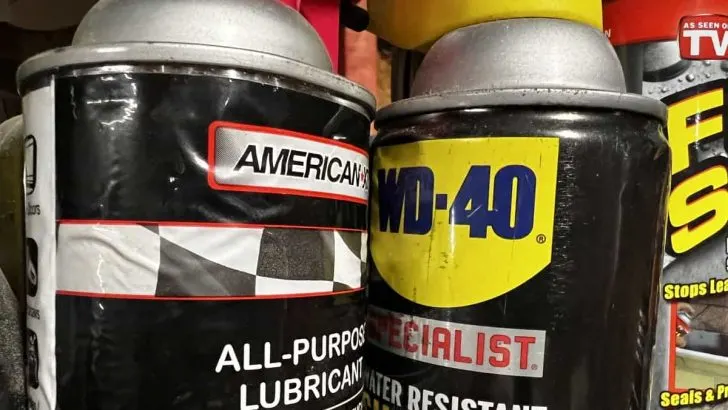The first product many people think of when it comes to a lubricant is the WD-40, but you can use many other efficient alternatives instead. Although the beloved lubricant works well, there are better and cheaper methods out there to lubricate your hedge trimmer.
There are a few alternatives you can use instead of WD-40 to lubricate your hedge trimmer, including any type of air tool lubricant, chain oil, vegetable oil, olive oil, or all-purpose silicone spray lubricant. You can also spray diesel on your blades, but you can’t rely on that alone.
In the following sections, I’ll discuss what you should use to lubricate your hedge trimmer in greater detail. I’ll also delve into how often you should oil your blades, how you should clean your blades, and what happens if you don’t lubricate them.
What Lubricant Should You Use for a Hedge Trimmer?
You should ideally use a silicone spray lubricant for your hedge trimmer. Silicone spray lubricants lubricate the hedge trimmer and protect it from water damage and rust. Other affordable lubricants include vegetable oil, chain oil, or machine oils.
Vegetable Oil as a Hedge Trimmer Lubricant
An excellent way to keep your hedge trimmer lubricated and protected is to use a vegetable oil spray. You likely already have vegetable oil in your kitchen, but if you don’t, it’s cheap to buy in any grocery store.
Since vegetable oil isn’t a harsh tool oil, it will be kinder to your plants and bushes. It’s one of the most gentle oils you can use, but it won’t work as well as other lubricants in the long run. But if you’re looking for something easy to find and affordable, you should undoubtedly consider vegetable oil as a lubricant for your hedge trimmer.
As well as vegetable oil, you can use other cooking oils to lubricate your hedge trimmers, such as olive oil or canola oil.
Silicone Spray Lubricants for Hedge Trimmers
One of the best types of lubricant you can use for your hedge trimmer is a silicone spray lubricant. It’s easy for the blades on your trimmer to get rusty and damaged, and a silicone spray lubricant will prevent this from occurring while simultaneously keeping it lubricated and quiet (source).
An example of a silicone spray lubricant is the B’laster Industrial Strength Silicone Lubricant (link to Amazon). Be careful not to apply too much of it to your trimmer; it won’t damage the trimmer, but it won’t be suitable for your garden if there are too many chemicals.
Can You Use Diesel To Lubricate Your Hedge Trimmer?
You can use diesel to lubricate your hedge trimmer, as it is refined from crude oil at petroleum refineries, However, it acts as a weak lubricant, so it shouldn’t be used alone. You can spray diesel on your hedge trimmer between the times you lubricate it with a different oil.
If you need a more visual representation of how you can use diesel on your hedge trimmer, you should check out the video below:
Diesel Isn’t Good for Plants, So Don’t Use Too Much
Although you can indeed use diesel to maintain your hedge trimmer’s blades, you must make sure that you don’t overuse it; all you need to do is spray it lightly on the blade.
Diesel is toxic to plants. There’s a chance your leaves may die if they come into contact with it. Only touch the hedge parts you want to cut off as it doesn’t matter if they come into contact with diesel.
How Often Should You Lubricate a Hedge Trimmer?
Ideally, you should lubricate your hedge trimmer before and after each use; this will keep it from drying up and getting damaged, so you must do it often. You shouldn’t wait until the blades get dry and rusty to lubricate because this will end up damaging the hedge trimmer.
Although the guideline is to lubricate it before and after each use, you should oil your hedge trimmer during use if you’ll be using it for a while. It may start to dry up and make loud noises if you use it for an extended period, so there’s no harm in applying more lubricant to make it work more smoothly.
How Do You Clean a Hedge Trimmer?
You should use some soapy water and a cloth to clean a hedge trimmer. Make sure you plug it out before cleaning because you don’t want to risk any injuries. After you’ve cleaned it and let it dry, you can apply some lubricant; this will keep it from rusting.
After using your hedge trimmer, you should remove any branches or other bits of dirt using a cloth. Then, you can soak the blades in warm, soapy water to sanitize them. Any detergent is appropriate for cleaning the trimmer.
It’s important to apply lubricant to your trimmer once it’s dry. Otherwise, there’s a big chance it will rust and get water damaged.
You Should Clean Your Hedge Trimmer After Every Use
It’s good practice to clean your hedge trimmer after every use to keep it in good shape. Removing all dirt after each use and soaking it in water will help keep it clean and in good working order.
Failure to clean your trimmer after each use will allow sap, dirt, and branches to sit on it, which will cause it not to work as well the next time you use it.
What Happens if You Don’t Lubricate Your Hedge Trimmer?
If you don’t lubricate your hedge trimmer, it will become loud, rusty, stiff, and won’t cut as well as it should. Lubricating your hedge trimmer will reduce friction, so it’s essential to use it on your hedge trimmer if you want it to work correctly.
Lubricating is easy and only takes a minute, so there’s no reason not to do it. By lubricating your hedge trimmer before and after each use, you’re keeping it free from rust, sap buildup, friction, and unwanted loud noises!
Conclusion
You can use many lubricants for your hedge trimmer instead of WD-40, including other silicone spray lubricants and even vegetable oil.
Some other essential things to remember from this article are:
- Diesel can help lubricate the blades, but you shouldn’t use it alone.
- Lubricate your hedge trimmer before and after each use.
- Clean your hedge trimmer blades with warm water and detergent.
- Not oiling your trimmer will cause rusting.
Recommended Reading:

